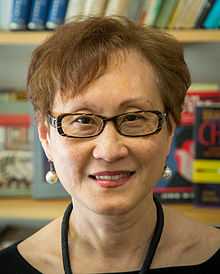Jing Wang

Jing Wang is Professor of Chinese media and Cultural Studies and S.C. Fang Professor of Chinese Language & Culture at Massachusetts Institute of Technology. She is jointly appointed to MIT's Comparative Media Studies and Global Studies & Languages.[1]
Jing Wang is the founder and organizer of MIT’s New Media Action Lab.[2] In spring 2009, Professor Wang launched an NGO2.0[3] in collaboration with four Chinese universities including the University of Science and Technology of China,[4] two Chinese NGOs, and corporate partners including Ogilvy & Mather China and Milward Brown. The project, funded by Ford Foundation in Beijing, is designed to enhance the digital and new media literacy of grassroots NGOs in the underdeveloped regions of China and deliver an interactive mapping platform [5] built on Ushihidi, complete with Web 2.0 training courses and a Chinese field guide to best practices and software of social media for nonprofits.
Professor Wang started working with Creative Commons in 2006 and serves as the Chair of the International Advisory Board of Creative Commons Mainland China. She was appointed to serve on the Advisory Board for Wikimedia Foundation in 2010. She serves on the editorial and advisory boards of ten academic journals in the US, Australia, Taiwan, Hong Kong, and the UK, which include journals such as Global Media and Communication; Advertising & Society Review; positions: east Asia cultures critique; Chinese Journal of Communication; Inter-Asia Cultural Studies Journal: Movements; The Chinese Journal of Communication and Society, etc.
Books
- Brand New China: Advertising, Media, and Commercial Culture was published by Harvard University Press in 2008. The Arabic edition (Beiru Arabic Science Publishers) came out in 2009. The Japanese edition (Iwanami Books) came out in 2011, and the Chinese edition (Peking University Press) was published in 2012.
- High Culture Fever: Politics, Aesthetics, and Ideology in Deng's China
(Duke University Press, 1996).
- The Story of Stone: Intertextuality, Ancient Chinese Stone Lore, and the Stone Symbolism of "Dream of the Red Chamber," "Water Margin," and “Journey to the West." In book series “Contemporary Interventions” (ed. Fredric Jameson and Stanley Fish). Durham and London: Duke University Press, 1992. Winner of the Association for Asian Studies Joseph Levenson Book Prize for 1994.
Edited
Locating China: Space, Place, and Popular Culture. In the series of “China in Transition” (ed. David SG Goodman). London and New York: Routledge, 2005. Paperback edition, 2006.
With Tani Barlow, Cinema and Desire: Feminist Marxism and the Cultural Politics in the Work of Dai Jinhua. New York & London: Verso. 2002. Chinese Popular Culture and the State, a special issue for positions: east Asia cultures critique, 9:1 (spring 2001). [Nominated for the 2001 MLA Council of Editors of Learned Journals Award for the category of the Best Special Issue].
China's Avant-Garde Fiction: An Anthology. Durham and London: Duke University Press, 1998.[Second Printing, 2004].
Candy R. Wei Memorial Scholarship
Jing Wang established a scholarship fund in at the University of Michigan School of Art & Design in 2001 to commemorate her daughter Candy R. Wei . Candy R. Wei was a talented young artist. Her signature work consists of three-dozen drawings, paintings, and woodblock prints that celebrate the moment of fertilization of the egg. The recipients of this fund made individual contributions to this site by submitting works inspired during their study abroad.
References
- ↑ MIT. "Jing Wang." Retrieved Jan 10, 2013.
- ↑ New Media Action Lab, MIT http://web.mit.edu/newmediaactionlab/
- ↑ NGO2.0 Project http://www.ngo20.org/
- ↑ MIT New Media Action Lab. "." Retrieved Jan 10, 2013.
- ↑ NGO2.0 mapping platform http://www.ngo20map.com/
External links
- Candy R. Wei's memorial article by Jing Wang
- NGO 2.0 Project in China
- Wikimedia Foundation Advisory Board
- New Media Action Lab of MIT
- Google Mapping of NGO2.0 China